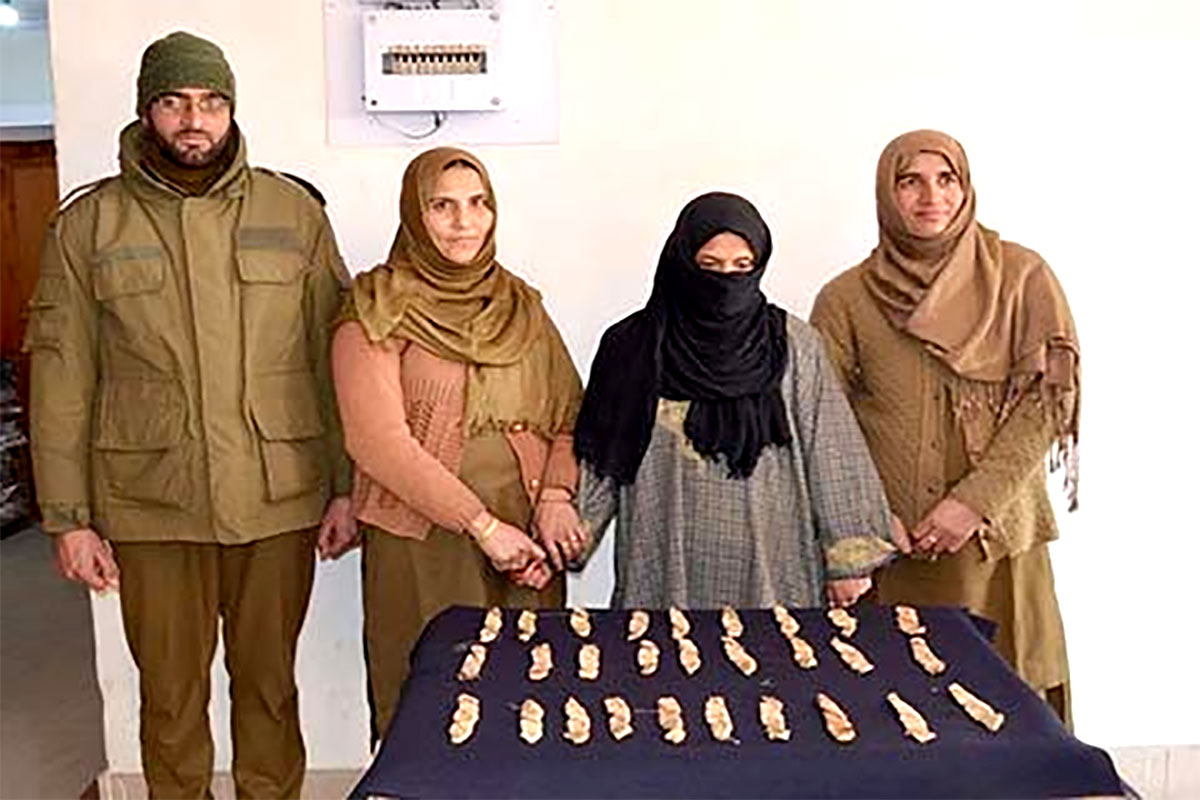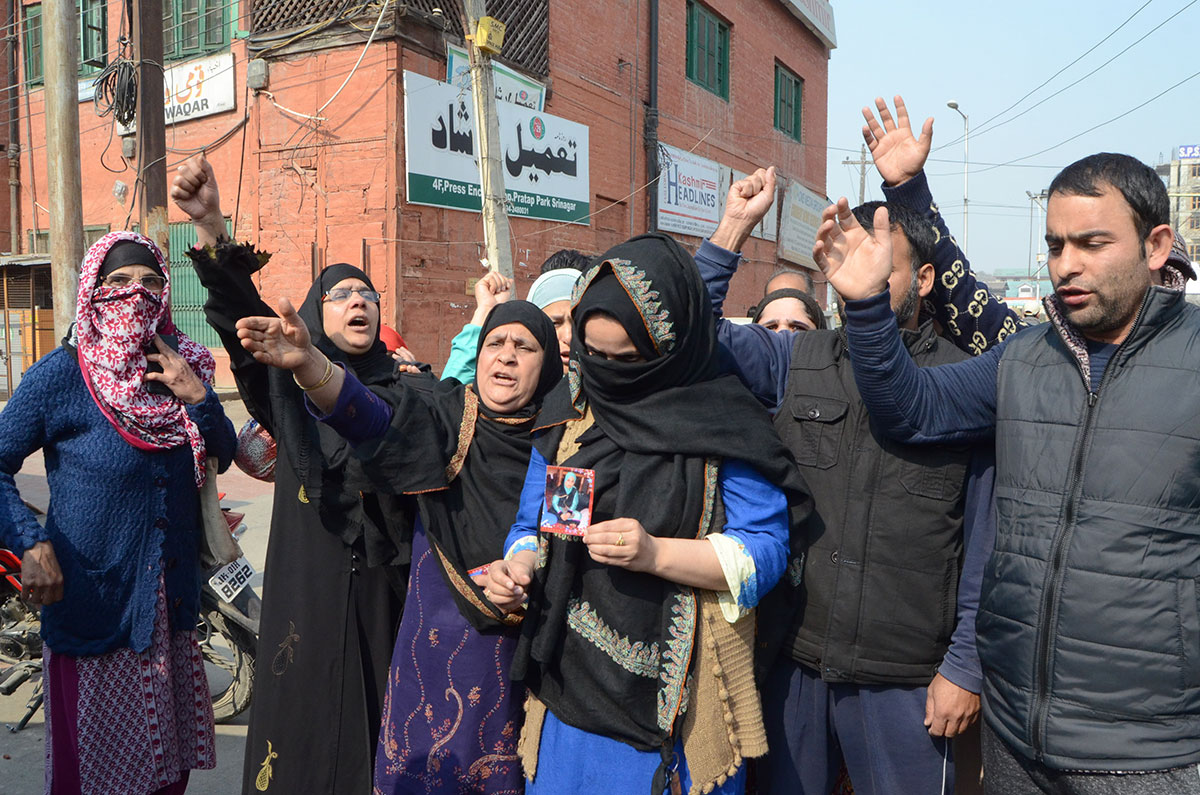The days when visiting a police station was anathema for women in Kashmir are over. Now two of the jails in Kashmir have women barracks and they are not empty, reports Saima Bhat

In the past, Kashmir’s patriarchal society had defined the boundaries for women offering them the back seat and preventing them from participating in events considered as male’s heritage. The trend is changing now.
Not long time ago, Kashmiri women were not found in police stations and courts, since these places carried a social stigma. But the militancy and a sudden spurt in violence changed it all. Not only have women started participating in the political and social uprisings, but many are at the forefront of a spurt in crime rate in Kashmir. This cultural shift has led to an increase in the number of women inmates in Kashmir jails.
The only women’s cell in Central Jail, Srinagar, was set up in 1933, but the officials don’t have any information about the first woman prisoner who was lodged there. Years later, their presence is now increasingly marked in jails.
Officials said, they are holding 118 females in jails across Kashmir. “There are 21 detainees in Srinagar’s Central Jail and 15 in the Baramulla Jail,” DIG, Prisons Dr MS Lone, said. “The number is higher for Jammu division where there are 81 detainees.” Of them, four are convicts in Jammu jails and two in Kashmir jails; rest of them are under trails.
He says the facilities are available for female detainees at Srinagar and Baramulla jails only.
“In Central Jail Srinagar, we keep the female detainees busy with cutting, tailoring and embroidery, while as in Jammu, they have an additional facility of saloons,” Lone said.
In 2012, when this reporter visited the district jail in Baramulla, there were 19 females imprisoned. After the permission from the concerned officials, the reporter was allowed to meet the female detainees in the jail, but without using a phone for recording or filming the detainees.

The meeting was mediated by the jail officials in a separate room, outside the jail cells, where the female detainees were called separately, one by one. The reporter was not allowed to go inside the jail barricades.
All of the detainees were shifted to Baramulla in July from Central Jail, Srinagar, which then was undergoing renovation. Although the women prisoners were shifted temporarily, officials say two blocks of women’s cell are being added to district jails of Anantnag and Kupwara in Kashmir valley to manage the increasing number of women prisoners. Most of the women inmates in the jail were held in cases of murder and drug peddling. There were also some cases involving women held for the alleged involvement in militancy activities and domestic violence related cases.
“The number of female prisoners is lesser in Kashmir compared to Jammu or any other state of India where the crime rate is higher,” the then Additional Director General (Prisons), Navin Aggarwal, had said. “These 19 ladies are under trails and many others get eventually bailed out. So eventually, the number is on a smaller side.”
The woman prisoners share a common hall in Baramulla jail with a capacity of 20 persons. The hall had a separate VIP room as well but it had been kept aside for female political prisoners. Of the 19 women inmates, two had infants with them.
When this reporter met the other lady inmates in the jail, most of them were psychologically disturbed and every one of them complained that they were not able to sleep. The inmates said they were facing a delay in court attendances since they were shifted to Baramulla jail, almost 52 Kms from capital Srinagar city and it takes a lot of time to reach their respective courts. In absence of any extra-curricular activities, the delayed court hearings have only increased the woes of the inmates.
The jail authorities, wishing anonymity, say the change in environment has led to these psychological disturbances of the inmates. “They are disturbed only because of the shift in their environment since they are not able to meet their families regularly,” one official said. “None of them is treated as convicts since they have not been found guilty yet.”
Shaheena, a mother of three, was arrested for charges of murdering her husband. It has been four years and a month now since she was jailed. Shaheen’s husband, a gatekeeper, was first working at Broadway Cinema in Srinagar and then shifted to Delhi Public School. The school authorities had provided them with an accommodation in Shivpora area. Everything was going smoothly for the family and their children were admitted to a local school.
But one day, when it was the holy Muslim month of fasting in 2008, everything changed for Shaheena. “We had guests at home and my husband went out to get meat. He never returned. We were waiting for him till the next day, and then we lodged an FIR,” she says. After two days of her husband’s disappearance, his body was found in Nowgam area; Shaheena was arrested for the murder. Her children were shifted back to Lolab by her family. Back in Lolab, their eldest daughter dropped out of school when she was a Class 7 student.
Barely managing to put up a smile on her face, she says she was married at the age of 12. “The only thing now bothering me is my children for whom I want to come out,” an emotional Shaheena said. “When I was in Central Jail Srinagar, I could, at least, spend a day with my children. But now, since we were shifted to this jail, I have not seen my children.” In the last three months, it was only once that her brother came to see her. The meeting lasted for just two hours.
In a press conference in September 2008, the then SSP Srinagar revealed that the police had made a breakthrough in the murder case of Mohammad Anwar Dar, husband of Shaheena. Police said it had arrested one of the accused, Manzoor Ahmad Ganie of Athawajan while the other was still at large, adding that Anwar’s wife had illicit relations with Manzoor, which lead to the murder. The case was registered with FIR No 97/08 under section 302 RPC.
Shaheena and other inmates at Baramulla jail regularly offer prayers and keep themselves busy with watching television and cooking food. “We take turns to cook our food. Other than that it is television that keeps us busy. The environment is affecting our health now,” a well built Haseena says. “But there is no real peace; it is missing.”
As the conversation with Haseena dragged on, it turned out that she was a patient of hypertension and had heart ailments as well. The jail authorities say the concern for her daughters is eating her up internally. “We have provided her with the required medical help,” an official said.
Haseena is a mother of three and she is in jail for the last three years. She was arrested in a case of drug peddling near Badambagh camp in Srinagar and was booked under Public Safety Act also. Her imprisonment has not only taken away her peace, but she also lost her father after her arrest.

“My husband is a shopkeeper in Sangam, Islamabad, who now takes care of our children. Being the lone daughter, I was always close to my family. But now, because of me, my family has to hang their heads in shame. I don’t know what I ate yesterday,” Haseena said. “I don’t even remember the date when I was arrested. They are behaving as if we are not needed by society. I wish to die. Only my death will bring respite to me.”
Another inmate, Maroofa, choked while narrating her ordeal. She was arrested along with her sister for killing the latter’s husband. Their case is going on in a court in Kulgam district. “I am not the only one who is suffering. My children are mentally disturbed as well. Initially, when we were in Central Jail, Srinagar, we used to reach court on time,” Maroofa said. “The day of hearing was an occasion of festivity. Everyone used to get a chance to see their families in court. Since the time we were shifted to Baramulla jail, everything has changed. Neither do we reach courts in time nor are we able to see our families now. We have also missed trails,” she says.
Anwar Jan, a resident of Uri is in jail from the last 18 months. She was arrested along with her son for the murder of her daughter-in-law. While talking, she instantly broke down. “I have not been given a chance to say anything in my defence,” she said. “I am a diabetic and suffer from hypertension. I had a stroke and one side of my body was paralyzed,” says Anwar who is in her early 60s and need support to walk. “We are poor people. My family got disintegrated since my arrest.”
Amongst the detainees, one lady, arrested in July 2012, after entering the room started her conversation. Flaunting her kaani shawl, “Isn’t this good? I have a few more and many pashmina shawls in my wardrobe. I am not an ordinary lady like others. I am not a criminal. I am the wife of a doctor. Back home, everybody talks to me with respect,” she brags for a while.
The jail authorities informed Kashmir Life that since this lady was detained she is very much disturbed.
She was arrested along with her two sons and her doctor husband for killing their neighbour, Ghulam Mohammad Shah in Natipora area of Srinagar. Srinagar police registered a case FIR no: 135/ 2012 under section 302, 34, 120B- RPC in police station Saddar.
After six years, all the accused in this particular case are presently under judicial remand and their bails have been rejected since then.
To keep the prisoners busy, the jail authorities have adopted various reforms. “We are imparting various skill enhancement programs, so that, in future, after coming out from jail, the inmates can reintegrate with the society. They should be given second chance,” Aggarwal said.

A private company had approached the jail authorities to engage the inmates in making bags. The company had promised to reimburse the workers, but the women inmates objected to the idea. “The company had a male instructor but the ladies refused to learn from him. Now we are trying to hire a female instructor,” a jail official said. “In Central Jail, Srinagar, we were engaged in a number of programs. We learned needlework. But then, we were not paid a penny for that. However, we had a female teacher who used to teach us Quran,” says Shaheena.
In the absence of proper jail reforms, the lives of these inmates are becoming more stressful which needs to be checked and rectified, so that once these inmates come out, they don’t become victims of the stress caused by living in isolation.
(Names of the imprisoned individuals mentioned in this report have been changed.)















